- Home
- Jimmy Guieu
Polarian-Denebian War 4: Space Commandos
Polarian-Denebian War 4: Space Commandos Read online
The Polarian-Denebian War
(Volume 4)
Space Commandos
by
Jimmy Guieu
translated by
Michael Shreve
A Black Coat Press Book
Introduction
Of all the authors published by Fleuve Noir’s Anticipation imprint, Jimmy Guieu(1926-2000) was, without a doubt, the one who achieved the most surprising commercial success. His first novel, Le Pionnier de l’Atome [The Pioneer of the Atom] (No. 5; 1952), dealt with the classic theme of a journey into the microcosmos and used the already old-fashioned concept of using a Hindu mage’s psychic powers in order to travel to Subatomica. The book introduced the character of Jean Kariven, a French anthropoarcheologist.
With his second novel, Au-delà de l’Infini [Beyond Infinity] (No. 8; 1952), Guieu used a new protagonist, American biologist Jerry Barclay and reversed the theme of his previous book. This time, it was our universe that was a microcosmos contained within the knee of a beautiful woman from a macrocosmos. Guieu continued the Barclay series for three more books, usually teaming Jerry up with good aliens in order to defeat evil aliens, and returning him to the macrocosmos for further adventures: L’Invasion de la Terre [The Invasion of Earth] (No. 13, 1952), Hantise sur le Monde [Fear over the World] (No. 18, 1953) and L’Univers Vivant [The Living Universe] (No. 22, 1953).
Kariven returned in Guieu’s third novel, La Dimension X [Dimension X] (No. 27; 1953) and Nous les Martiens [We Martians] (No. 31; 1954), in which the hero discovers that, in the far distant past, Martians had emigrated to Earth. The Kariven series enabled Guieu to explore his favorite themes such as UFOs, secret alien encounters, Von Daniken-like theories of ancient astronauts, secret societies, etc. He began sprinkling his novels with footnotes claiming that the various facts upon which he was basing his tales were indeed “authentic.”
Nine more Kariven novels followed, often dealing with time travel, lost civilizations, and a vast space war between the good Polarians and the evil Denebians, with Earth secretly caught in the middle: La Spirale du Temps [Time’s Spiral] (No. 36, 1954), Le Monde Oublié [The Forgotten World] (No. 41, 1955), L’Homme de l’Espace [The Man From Outer Space] (No. 45, 1955), Opération Aphrodite (No. 47, 1955), Commandos de l’Espace [Space Commandos] (No. 51, 1955), L’Agonie du Verre [The Death of Glass] (No. 54, 1955), Univers Parallèles [Parallel Universes] (No. 58, 1955), Nos Ancêtres de l’Avenir [Our Ancestors from the Future] (No. 62, 1956) and Prisonniers du Passé [Prisoners of the Past] (No. 72, 1956). Univers Parallèles featured a cross-over with Jerry Barclay, said to live in a parallel universe.
Guieu continued to exploit the UFO vein with increasing success, becoming a major French figure in UFO circles. After Kariven, he penned a number of mostly non-connected novels. Two featured a team of American investigative reporters, Ericksson and Wendell: Les Monstres du Néant [The Void Monsters] (No. 70, 1956) and Les Êtres de Feu [The Fire Creatures] (No. 80, 1956). He portrayed the near-death of Mankind, caused by the increase in ambient radioactivity in the atmosphere, and its rebirth in a trilogy: La Mort de la Vie [The Death of Life] (No. 87, 1957), Le Règne des Mutants [The Reign of Mutants] (No. 91, 1957) and Cité Noë No. 2 [Noah City No. 2] (No. 100, 1957). Guieu later revisited the same theme in Demain l’Apocalypse [Tomorrow the Apocalypse] (No. 402, 1969) and its sequel, L’Arche du Temps [The Ark of Time] (No. 407, 1970).
In Expédition Cosmique [Cosmic Expedition] (No. 134, 1959) and its sequel, Les Cristaux de Capella [The Crystals from Capella] (No.140, 1959), Guieu tackled space opera introducing a new hero, Claude Rousseau, a scientist aboard the Fulgurant, the first European interstellar exploration ship. But looking for a more flexible format, he soon switched to chronicling the exploits of two daring space traders of the future, Ronny Blade and Will Baker. The series began with Piège dans l’Espace [Space Trap] (No. 145, 1959) and continued in Le Secret des Tshengz [The Secret of the Tshengz] (No. 199, 1962), Les Forbans de l’Espace [The Space Pirates] (No. 224, 1963), Les Destructeurs [The Destroyers] (No. 237, 1963), etc. A listing of all the Blade & Baker adventures is provided at the end of this introduction.
Another notable work of the period is Opération Ozma (No. 203, 1962) and its sequel L’ge Noir de la Terre [The Dark Age of the Earth] (No. 212, 1962) in which the hero, Ned Gowland, discovers that Project Ozma, a pioneering SETI experiment, is being used by aliens to invade Earth.
In 1967, with Le Retour des Dieux [The Return of the Gods] (No. 337), Guieu revamped the Kariven character into that of journalist Gilles Novak. Unlike Kariven, Novak is Guieu’s alter ego and lives the kind of life that the author would have liked to live. Indeed, most of the supporting cast are thinly-disguised portrayals of Guieu’s own friends. Like Kariven, Novak dealt with all kinds of X-files phenomena, but unlike the dashing archeologist of the 1950s, he was helped in his battles by Michael Merkavim, the head of a new, powerful Templar Order, the Chevaliers de Lumière [Shining Knights] equipped with a variety of futuristic weapons, including flying saucers, and based in a parallel dimension. Merkavim was introduced in Les Sept Sceaux du Cosmos [The Seven Seals of the Cosmos] (No. 343; 1968) and L’Ordre Vert [The Green Order] (No. 384; 1969) the latter a cult favorite.
Due to the phenomenal growth in popularity of his novels, Guieu was granted his own imprint in 1979. At first, it reprinted updated versions of his original novels, then it began publishing a series of share-cropping novels written by other writers. A separate spin-off series devoted to the Shining Knights was also published from 1987 to 1989. In the 1990s, Guieu became a trademarked phenomenon, unique in the annals of French science fiction. His tremendous success was attributable to a clever mix of occult facts, mild eroticism, ultra-conservative bigoted politics and a forceful, if simple, story-telling style, successfully imitated by his successors. Most of his loyal readers were drawn from the general public rather than the science fiction market and were not science fiction fans per se, but only Jimmy Guieu fans.
With Guieu’s death in 2000 and the changing tastes of the public, this publishing phenomenon did not long outlive its creator and the imprint was cancelled in 2003.
Jean-Marc Lofficier
SPACE COMMANDOS
In the present state of our Human Sciences, it is pretty certain that no country has suddenly discovered the secret of a power source that would explain how “Flying Saucers” could accomplish their extraordinary feats… It comes down, therefore, to an extra-terrestrial origin, to that famous ESMA1 that are increasing their observation flights because the Earthlings have discovered the secret of the atom and appear able to become a danger to other worlds.
-- General L. M. Chassin, Commander on Chief of the French Air Force and Air Defense Coordinator
CHAPTER ONE
For a long time Hogounn watched the blurry spot form on the triangular screen of his space teleradar and start to come into focus. Sitting in front of his tilted control panel he skillfully maneuvered a kind of hexagonal dial, slipped in two cream-colored strips that touched two contacts and when all this was done he put his hands flat on the blue metal panel and sighed.
Injya, sitting next to him, was piloting the spaceship. She pulled down three small levers, slowly turned an oval wheel with an off-center axis and leaning back in her strange, bowl-shaped chair, left everything to the guidance system of the electro-magnetic radar-pilotage.
She looked over at her companion with a smile and said, “You’re funny, Hogounn. Every time we approach planet T27 you sigh the same way and do the same thing. Even if I don’t see you I’m sure that after sighing you’re going to put your hands flat on the instrument panel and look up at the ceilin
g, exasperated.”
Hogounn smiled back at the ironic remark and shrugged his shoulders, replying, “I don’t know if you’re having fun but these observation trips are awfully monotonous to me. Since we’ve been studying the pseudo-civilization of these natives on T27, I’ve ended up wondering if we’ll ever get the go ahead to contact them.”
“Our leaders are full of wisdom, Hogounn. From time immemorial they’ve studied the galactic races who are still in their ‘infancy’ and they know perfectly well that any premature contact could have negative consequences for our projects. You purposely forget that we’re dealing with primitives.”
“And what primitives!” Hogounn added. “They are as big as they are stupid. A decan hasn’t gone by without one of their nations attacking another or some bloody civil war destroying their people.”
“They’re barbarians, I agree, but they’re crossing an evolutionary stage that we crossed before. In time and thanks to our future intervention they’ll get the wisdom they’re lacking. We have to be patient. Besides, luckily for our future relations with these beings, there are a few among them who have a quotient of perception and knowledge clearly higher than most of their brothers.”
“How lucky!” Hogounn grumbled. “If the order to land and show ourselves to these primitives doesn’t come soon I think I’ll ask for a transfer to a commando unit operating in some other solar system.”
Injya cast a furtive glance at her companion who saw the disappointment in her eyes and in her fleeting frown. He regretted his words because he was pretty sure that Injya felt more than just friendship for him. To transfer to a commando unit was a pure and simple desertion of the girl whom he hoped to get up enough courage to confess his feelings for some day.
He was shaken out of his thoughts when a bank of lights on the triangular teleradar started blinking. On the frosted glass was the surface of a continent, growing bigger very quickly, looking like it was coming straight at them. Under the spaceship, which had just entered the atmosphere of T27, and on the hemisphere plunged in darkness, some lighter spots sprinkled with luminous dots marked the location of the cities being flown over at 3000 miles an hour.
Injya hovered over the urban area for 20 seconds and zigzagged down for several miles before heading toward a kind of narrow path on which ran two metal rails crossed by countless strips of wood.
The spaceship set down smoothly at the same time as six telescopic legs emerged from its underside. Without a bump and in perfect silence the ship landed.
Injya and Hogounn opened a narrow recess across from the cockpit and took out two heavy spacesuits so they could make a brief outing on this world whose atmosphere they could not breathe.
Hogounn courteously helped Injya put her spacesuit on, seal the huge, metal helmet with a rectangular opening at eye level make of transparent xoning and checked her reserves of artificial air built into the stocky “chest” of the protective suit.
When he, too, was stuffed in his clumsy metal outfit whose legs were the only jointed parts, he went to activate the long-distance security system. The controls inside the spacesuit could also work the system no matter where they were. The robotic device could “cover” them, if need be, if they were far from the ship.
A rectangular hatch opened in the side of the ship and the two astronauts jumped to the ground. A polygravity belt automatically corrected their weight to the same as their home planet, allowing them to walk without any trouble. Their metal outfits, however, sometimes made them waddle in a strange way.
Hogounn, followed by Injya, walked down the path between the two metal rails, jumping from one cross beam to the next. Their upper limbs were imprisoned in the cylindrical chest where it was easy for them to work the controls of their various devices: weight corrector, podogyroscope (so they would not fall), feeder valves (for the artificial air), weapons and remote control for the long-distance security set up around the spaceship.
On the edge of the path cut by the two rails stood one of those odd, rectangular houses with a roof slanting on two sides away from each other.
Hogounn stopped, as did Injya.
“My Onka ray detector is reacting,” he spoke into his transmitter. “A living being is not far from us.”
“I’ve got it too,” Injya said. “It’s a little thing because our projection beams stop detecting it at thigh-level.”
“Exactly. The tingle from the reflecting waves stop a little higher than my knees.”
“Intelligence quotient 0.13,” Injya announced, “warm blooded. It’s a creature much more primitive than most of the natives on this planet.”
Looking toward the gray building on the side of the iron-lined path, they noticed a rectangular opening up above casting a pool of light on the ground. In the sky the only satellite of the T27 planet colored the landscape with a whitish-blue light. Some clouds, a mixture of oxygen and hydrogen, sometimes veiled the glow of the satellite, which lacked an atmosphere.
Hogounn increased the power of his Onka ray detector. Thanks to the sensory scale affixed directly to his skin he controlled the magnitude of the reactions on a small screen that was clearly visible in the bottom of his helmet.
“There are two natives in that building, maybe three. I detected a double intelligence quotient varying from 65 to 77. The third barely reaches 29.”
“I think it’s a non-adult native,” Injya guessed, “because its heartbeats is around 105 as opposed to the 70/75 of the two others nearby. They are normal beats and not sped up by an emotional disorder.”
A long, faint rumbling that soon turned into shrill, clipped cries screamed through the silent night. Hogounn and Injya stopped and went on the defensive.
“It’s that small creature,” Hogounn said. “Sneaking around in the shadow of that wall. It’s found us out.”
“Doesn’t matter. We can still go a little farther to test the natives reactions… if they decide to leave their shelter.”
The two astronauts waddled along the crossties and metal bars. They stopped a second time on alert.
A big rectangle opened in a wall of the cubic building. A bright light poured out. In the rectangle of light the outline of a creature appeared with two arms and two legs and a head covered with black hair on top. In its general shape it resembled the two observers but it was twice as big.
“An inhabitant of planet T27,” Injya whispered as she watched with curiosity.
“You can speak louder,” her partner said. “It can’t hear us in our helmets.”
The native pronounced some garbled words, apparently talking to someone much, much smaller than itself and also pointing to something in the dark. In fact, it was speaking to a small, hairy creature with four short legs. An extremely mobile appendage came out of its body above its rear legs. When the primitive stopped talking, the hair system of the small creature bristled, its eyes turned shifty, its rear appendage curved between its legs and it started grunting and growling. The giant bent down and with one of its long upper limbs it tapped the head of the scared thing, whispering to it.
Hogounn turned up his phonic recorder to capture the sound emissions of these strange beings.
The small creature continued growling and casting frightened glances in the night. The giant stood up straight and lifted up a cylindrical object. The instrument threw a beam of light toward the place where its four-legged friend was looking.
The giant jumped and cried out. It looked disturbed at the sight of this weird “thing” (it obviously did not know what a spaceship was!) that sat so close to its box dwelling. It must have wondered how this amber object could have arrived so secretly. Was it an airplane? If so, it was very different from what it was used to.
All of a sudden the small, four-legged creature started barking furiously. Then it crouched down on its belly and slunk behind the giant, yelping and whining. The native, stupefied and terrorized and not believing its rudimentary senses, finally saw the cause of its dwarf friend’s fright.
There
, close by, in the shadows that its light tube was now chasing away, two creatures, like cylindrical mannequins, were standing there on two legs (skinny compared to its own) and staring through the transparent part of their helmets.
Hogounn and Injya enjoyed the terror that they struck in this inhabitant of planet T27.
“I think that’s enough,” Hogounn counseled. “Let’s activate the security and get back to our ship.”
Lowering a tiny lever inside his spacesuit he turned it on. A short distance away, an opening in their ship parked on the path shot out a green ray and swept across the countryside until it rested in the giant, who stumbled back in fear. It was instantly paralyzed while its four-legged friend, because of its size, escaped the emerald green light beam and scurried into the boxy house where the other two natives remained.
Hogounn and Injya headed for their spaceship, passing close by the giant who could not move, frozen with a look of utter confusion.
The two astronauts jumped onto the ramp leading into the ventral hatch. Very soon, sitting at their command posts, they stopped the green paralyzing ray and started up the gravito-magnetic thrusters. When the ray was gone the giant could move. In a daze and pale with fear it dropped its portable light and backed away. Its big, frightened eyes watched the mysterious machine rise up with its two weird “creatures” that came straight out of a nightmare.
In a few seconds the spaceship reached a very high altitude and shot off toward the second observation astrobase that had been orbiting around planet T27 for a little while. Out of their spacesuits now Hogounn and Injya looked at each other and broke out laughing.
“I’m a little ashamed of playing tricks like that on these primitives,” Injya confessed.
“Nah, it’s necessary… and it confirms our opinion of them. With a few rare exceptions their reactions are always the same. When they see us either they run away as fast as their long limbs can carry them or they fall to the ground. We make them so scared every time.”

 Polarian-Denebian War 6: Prisoners of the Past
Polarian-Denebian War 6: Prisoners of the Past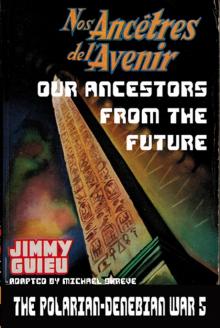 Polarian-Denebian War 5: Our Ancestors From the Future
Polarian-Denebian War 5: Our Ancestors From the Future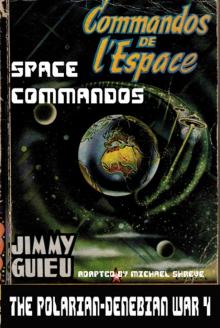 Polarian-Denebian War 4: Space Commandos
Polarian-Denebian War 4: Space Commandos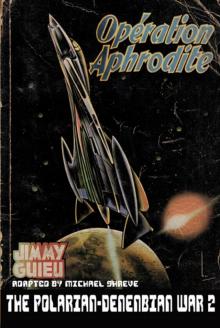 Polarian-Denebian War 2: Operation Aphrodite
Polarian-Denebian War 2: Operation Aphrodite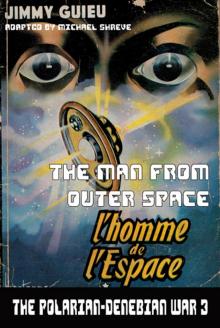 Polarian-Denebian War 3: The Man From Outer Space
Polarian-Denebian War 3: The Man From Outer Space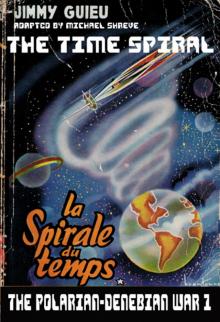 Polarian-Denebian War 1: The Time Spiral
Polarian-Denebian War 1: The Time Spiral